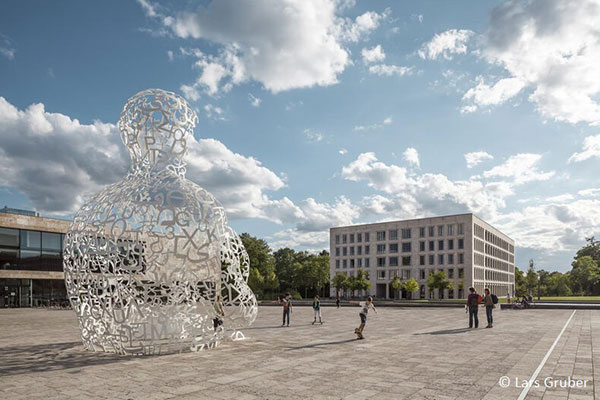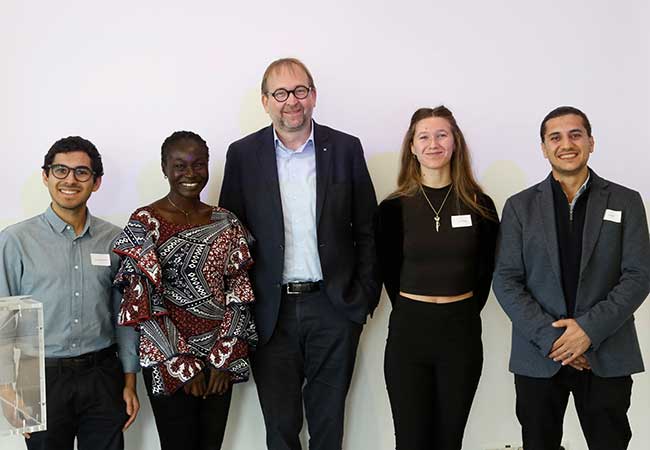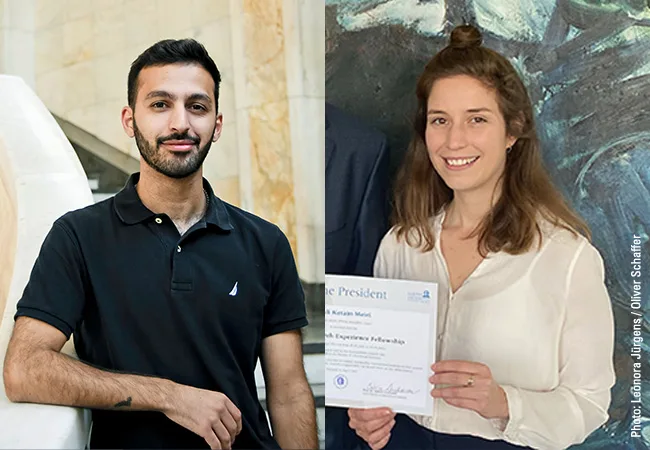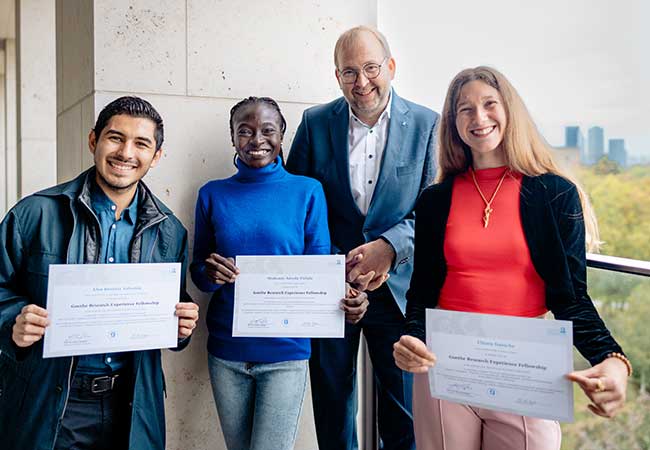Welcome to the Goethe Research Experience Program!
The Goethe
Research Experience Program (GREP) offers scholarships for advanced
undergraduate and master students of high academic standing to gain
cutting-edge research experience in one of Goethe University's
multidisciplinary research profile areas. Students can benefit from individual supervision by excellent
researchers, build their own research network and strengthen their academic and
intercultural competences through working and studying with
professionals on a predetermined 2-6 months research project with the
option to gain credit points that can be recognised towards the degree at
the home university.
- For advanced undergraduate and master students with high academic standing
- 2-6 six months research visits in one of Goethe University's multidisciplinary research profile areas
- Individual mentoring and supervision by excellent research professionals from GU
- Optional online German language course offered by the Goethe-Insitute Frankfurt
- Participation in exclusive orientation program, social events and excursions in and around the city of Frankfurt
- English as working language
- Fellowship and ECTS Certificate
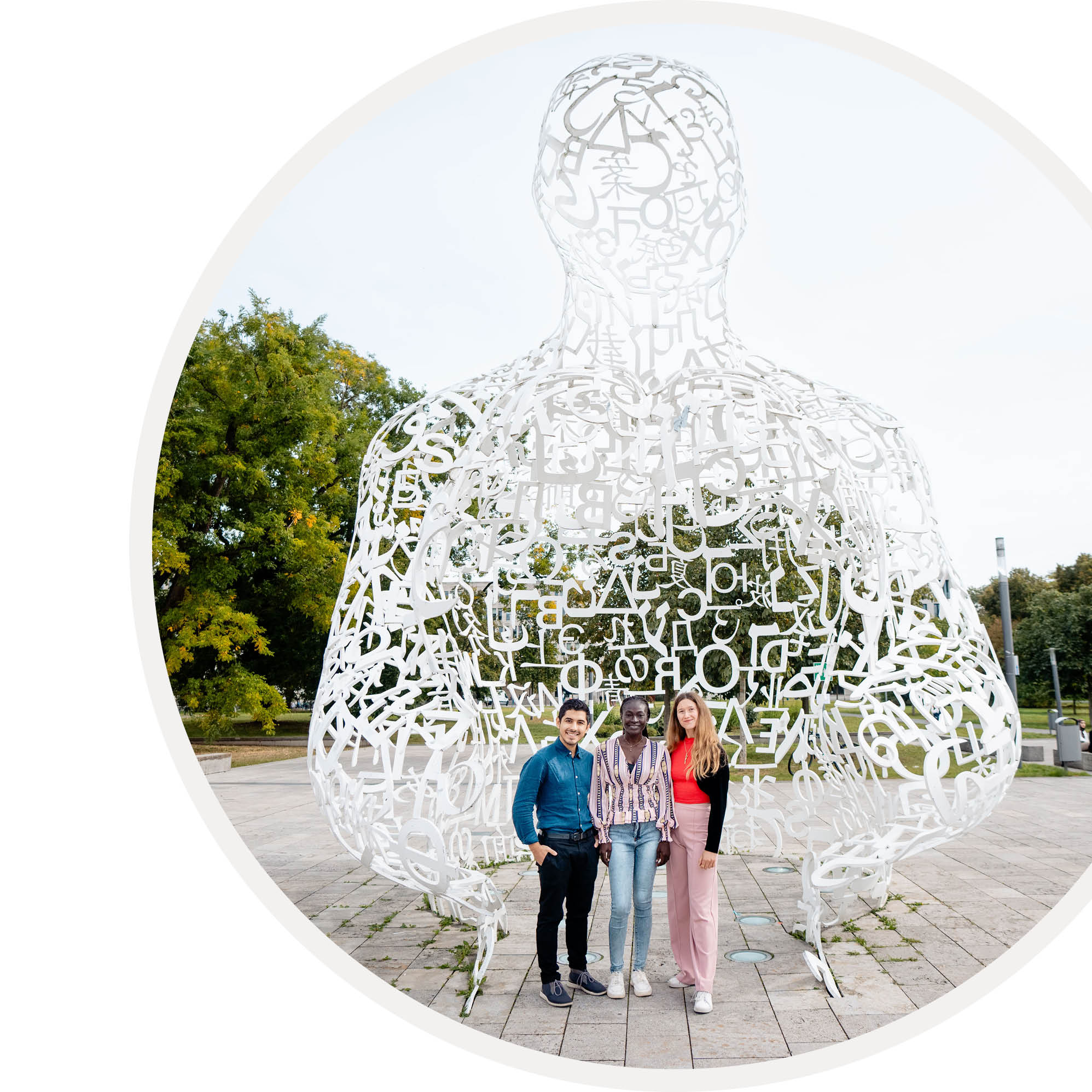
- Accommodation in private student residence incl. full coverage of rent
- Partial travel allowance (The travel allowance depends on the respective DAAD national flat rate for travel allowances of the respective year)
- Free intensive German language course
- Free access to public transport and museums
- Tuition waiver for university enrolment incl. access to campus networks
- Coverage of health insurance for students who do not have the European Health Insurance Card (EHIC)
- Personal advice on visa application, mandatory insurance etc.
- Students can pursue an individual research project, e.g. in preparation for their final thesis (2-3 months).
- Students from natural and life sciences can complete a laboratory visit as part of a mandatory elective module in specific degree programs at GU (2-3 months).
- Students can write their final thesis under dual supervision by the home institution and GU (3-6 months).
- During their reserach visit, students are placed in an established research group and conduct their own research under close supervision by research staff at GU.
- They are expected to report on their progress regularly, hand in a final written report and give an oral presentation in English at the end of the programme for an evaluation by the hosting research project.
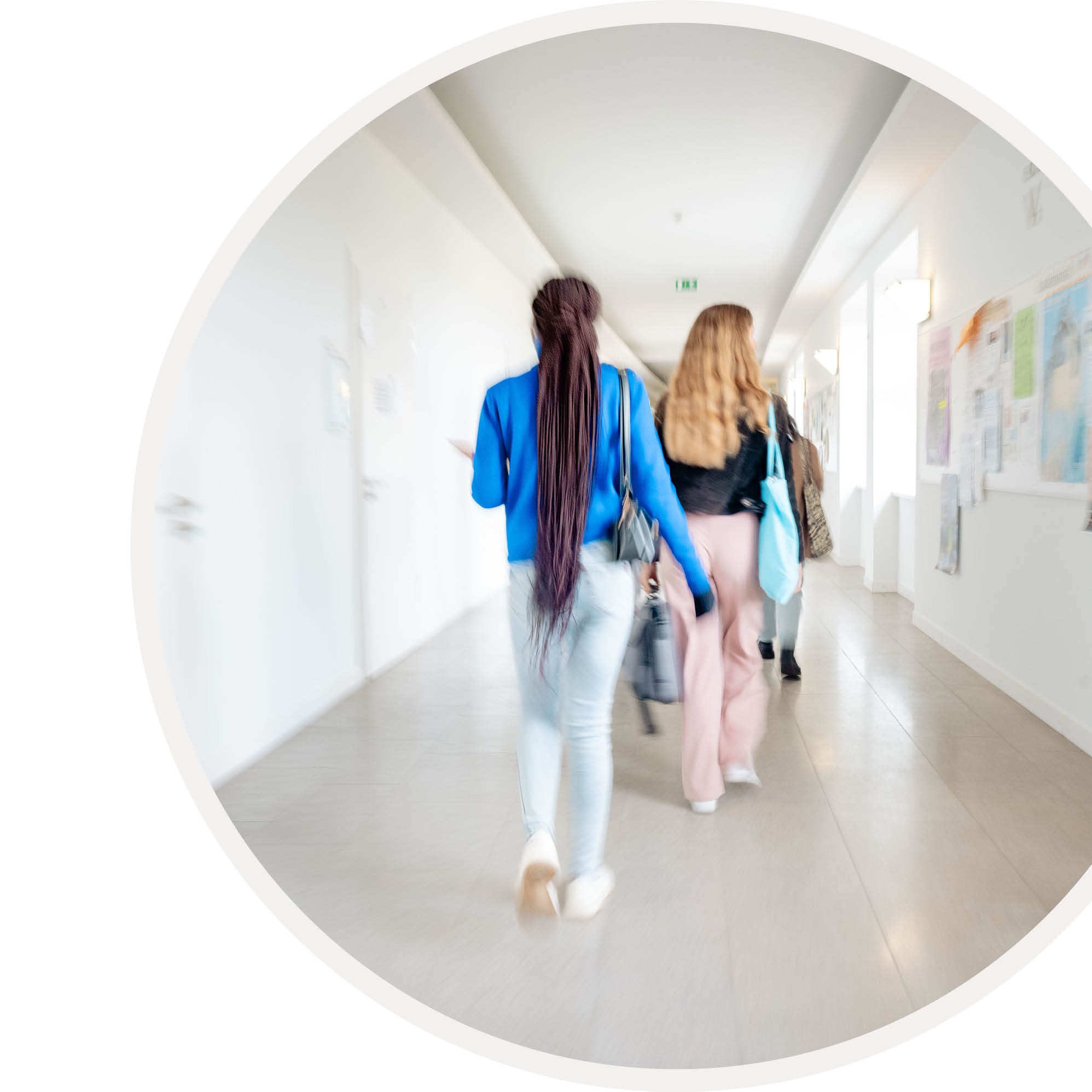
Research Projects
At Goethe University scientific excellence is concentrated in six profile areas of research, in which researchers from various disciplines and institutions collaborate in internationally competitive research projects. Interested students can choose to pursue an individual research visit within one of the designated research projects listed in our project database.
The research areas vary from natural and life science to social sciences and humanities:
Within the field of molecular and translational medicine, students can conduct research in cardiology, oncology, neuroscience and drug research at the existing research cluster Cardio Pulmonary Institute (CPI).
Within the field of biomedical sciences and technologies, students can develop new therapeutic approaches for complex diseases at the new research cluster EMTHERA.
Within the field of cell biology, biophysics, molecular biology, neurobiology, chemistry, bioinformatics and mathematics, students can conduct interdisciplinary research on subcellular architecture and cell behaviour at the new research cluster SCALE.
Within the field of theoretical physics and astro-physics, students can conduct research on heavy elements in the universe, neutron stars, kilonovas and gravitational waves at the new research cluster ELEMENTS.
Within the field of social sciences and media studies students can conduct interdisciplinary research on social conflicts and the question of trust in relation to peacemaking at the new research cluster ConTrust.
Within in the field of humanities and religious studies, students can conduct interdisciplinary research on the relations and perceptions between the three monotheistic religions "Judaism," "Christianity" and "Islam" in historical and contemporary global contexts at the research project DynRel.
Within the field of sustainability and biodiversity students can conduct research on environmental pollution, biodiversity loss, and climate change at the research project RobustNature
Degree Programs
Students from natural and life sciences can complete a laboratory visit as part of a mandatory elective module in one of the following study programs:
- M.Sc. Interdisciplinary Neuroscience
- M.Sc. Environmental Science
- M.Sc. Molecular Medicine
Winter Intake 2024/25
Duration: October 2024 - March 2025
NEW / Prolonged Deadlines!
Nomination Deadline: May 15th, 2024
Application Deadline: May 31st, 2024
Admission: within 4-6 weeks
Research visits: 2-6 months
The exact dates and duration of the research visit can be arranged individually!
German Online Course: during your stay
Duration: April 2025 - September 2025
Nomination Deadline: October 15th, 2024
Application Deadline: Oktober 31st,
2024
Admission: within 4-6 weeks
Research visits: 2-6 months
The exact dates and duration of the research visit can be
arranged individually!
German Online Course: during your stay
Summer Intake 2025
Duration: June 2025 - August 2025
Nomination Deadline: January 15th, 2025
Application Deadline: January 31st, 2025
Admission: within 4-6 weeks
Research visits: 8-12 weeks
The exact dates and duration of the research visit can be arranged individually!
German Online Course: during your stay
Two step application process
- Check the GREP website for
application requirements and deadlines
- Choose a research project of your interest from the GREP project database
- Get in contact with the responsible person for the reserach project to find an academic supervisor for your visit, e.g. by writing an e-mail and stating your research interest and motivation for the project
- Get nominated for the GREP-scholarship by your prospective supervisor.
- He/She needs to confirm your nomination via email to the GREP-team. Only if we get your nomination, you will be able to apply for GREP. The nomination serves as a first consultation. You can check if your interests coincide with the work, the research project is doing and if there they are able to supervise your research stay.
STEP 2
- After your nomination, we will send you a link to the online application form.
- Sign up with the
Mobility Online Portal of Goethe University.
- Follow the instructions provided by emails Mobility Online sends you and the information given in your workflow.
- Prepare your documents as indicated below and upload them on the application platform Mobility Online.
Application Documents
- Letter of Motivation
- CV
- B.A. Certificate for M.A. students stating your final grade
- School leaving certificate for B.A students stating your final grade (High School Diploma, A-Level (Secondary School), Baccalauréat (Lycée), Abitur, Matura)
- Current Transcript of Records, stating your current GPA
- Student Enrollment Certificate, confirming that your are currently registered at your home university
- Photo
Important Notes
- If you have any question feel free to contact us!
- Please consider the current deadline for winter intake 2024/25: April 30, 2024
- Late or incomplete applications will not be considered.
- Admissions and scholarship confirmations will be sent within 4-6 weeks
- Please consider carefully if you will be able to finance your stay.
- In case of late cancellation, your place cannot be given to another student.
You are eligibile for
application, if the following criteria apply:
- Nomination by a research supervisor at GU (find out more here)
- Bachelor or Master level student status at the time of application and during the intended research stay
- Good to very good academic standing GPA of 3.0 or above (US), 80% (Canada), among the top 35% of your class according to the ECTS grading scale
- Strong research interest matching the selected research project
- Proof of previous research experience and/or relevant extracurricular activities
The program language and student support is provided in English.
German language skills are not necessary for the acceptance into the program. However, GREP-fellows can apply for a German intensive language course at the Goethe Institute in Frankfurt.
German Intensive Courses are offered as an online course during your research stay and take approx. 5 weeks.
We will inform you about the exact course dates, once you are admitted to the program.
- Students are going to write a paper, give a presentation and receive a final grade for their program participation.
- Upon completion, students get a transcript of records with a written evaluation from their supervisor.
- Students can receive ECTS credit points, depending on the duration and workload of their individual research project.
The amount of ECTS credits will be pre-defined prior to the research visit. - ECTS credits account for the quantity of workload and time spent to complete your research project
- Practical work, individual research, written report, presentation etc. will be taken into consideration
- 1 ECTS accounts approx. 30 hours of academic work, approx. 1/2 Canadian / US credit
- Please contact your study program manager or program advisor of your home university for pre-approval and confirmation on credit conversion.
Since finding affordable housing in Frankfurt am Main is very difficult and
time-consuming, GREP facilitates accommodation for the time of your research
stay in private dormitories or shared flats.
All apartments and rooms in shared flats are fully furnished and have WIFI. Rooms in dormitories have a private bathroom. Cooking equipment, duvet and pillow are provided. Beside your personal belongings, you only need to bring bed sheets and towels.
- A central information and networking meeting with the GREP Team will facilitate the start and orientation of the project phase.
- Various events and social activities will take place alongside your research stay e.g. a University Campus Walk, a Frankfurt City Tour, dinner at a traditional restaurant to experience the famous Hessen specialities and much more.
- Additional social excursions in and around the City of Frankfurt will also be offered e.g. visit Museums, the European Central Bank (ECB), hiking tour in the Taunus region or vineyeards of the Rhein-Main region, a visit to Heidelberg City etc.
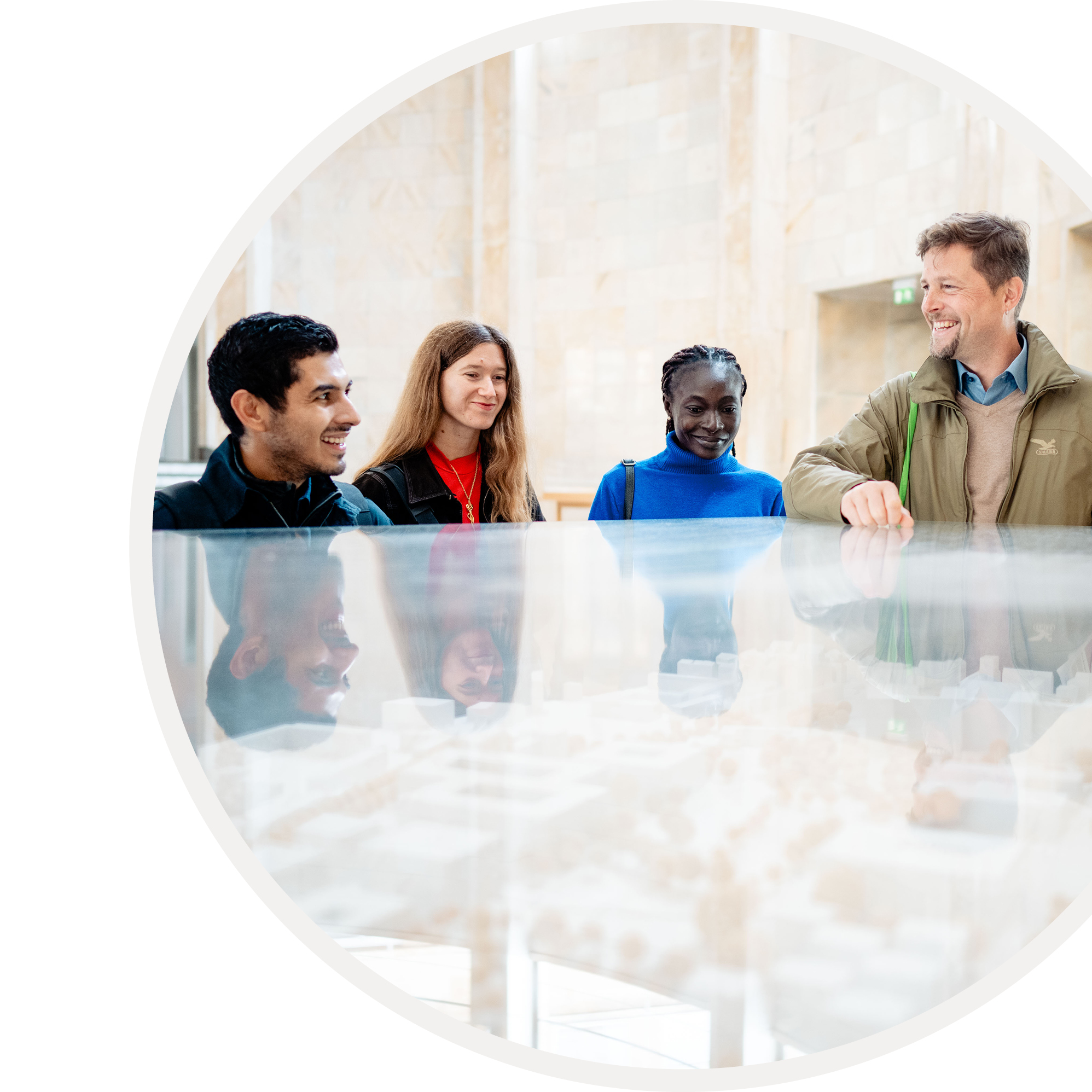
The Goethe Buddy Program supports you while you settle in Frankfurt! Your advantages for participation are:
- Support when you arrive (e.g. someone picks you up at the local train station or airport)
- Support when you have to go to authorities (e.g. registering in Frankfurt, open a bank account)
- Help finding your way around campus and the city of Frankfurt
- Improving your German language skills by actively communicating with native speakers
- Participation at events organised by the Internationaler Studientreff (IST)
Find out more!









